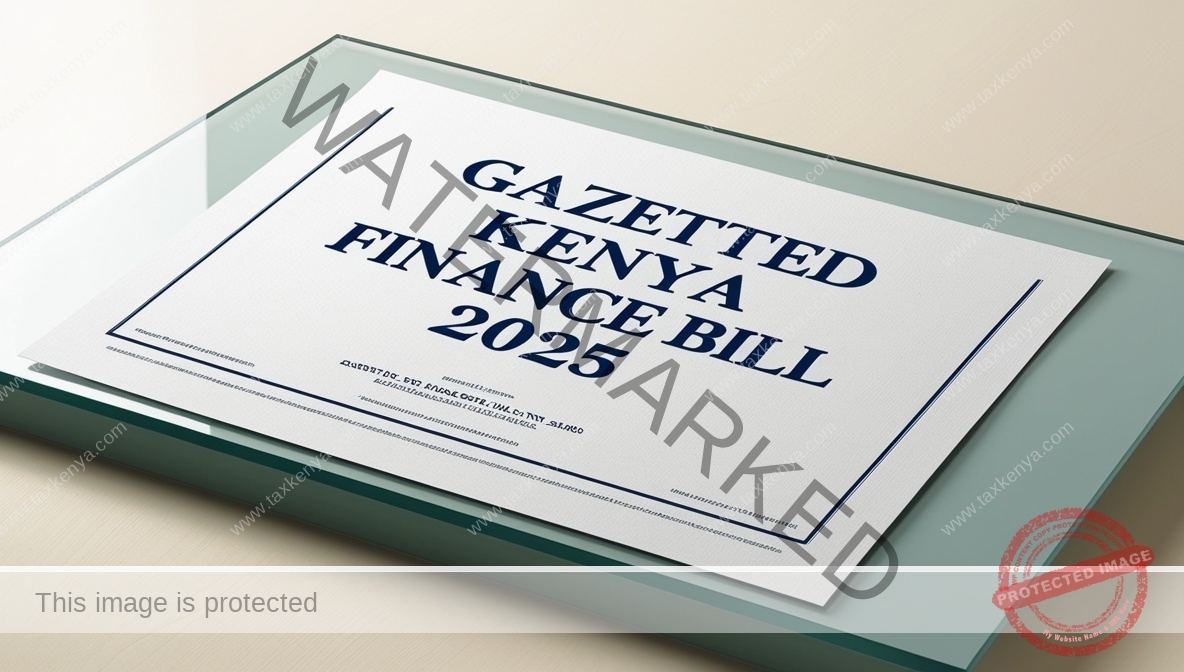This is a brief review of the main themes and key amendments proposed in the Finance Bill, 2025, concerning various taxes and duties in Kenya. The source is Gazette – Finance Bill 2025, that was published on 6th May, 2025 – access a copy HERE
- The Income Tax Act (Cap. 470).
- The Value Added Tax Act (Cap. 476).
- The Excise Duty Act (Cap. 472).
- The Tax Procedures Act (Cap. 469B).
- The Miscellaneous Fees and Levies Act (Cap. 469C).
- The Stamp Duty Act (Cap. 480).
Overview
The Finance Bill, 2025, proposes amendments to several key pieces of legislation governing taxation and duties in Kenya. The primary acts affected are the Income Tax Act (Cap. 470), the Value Added Tax Act (Cap. 476), the Excise Duty Act (Cap. 472), the Tax Procedures Act (Cap. 469B), and the Miscellaneous Fees and Levies Act (Cap. 469C), as well as the Stamp Duty Act (Cap. 480). The Bill aims to introduce measures for revenue raising and facilitate the collection of taxes.
Key Themes and Amendments
The Bill introduces a wide range of amendments across various tax regimes. Several recurring themes emerge:
a. Refining Definitions and Clarifying Scope
Numerous amendments involve clarifying or deleting existing definitions and introducing new ones within the Income Tax Act, Value Added Tax Act, and Excise Duty Act. This suggests an effort to enhance clarity and precision in tax legislation. For example, new definitions are introduced for “digital lender” and “digital marketplace” in the Excise Duty Act. Similarly, the definition of “related person” is significantly revised in the Income Tax Act.
b. Adjusting Tax Rates and Exemptions
The Bill proposes changes to various tax rates and introduces or amends exemptions. This includes:
i. Changes to individual and corporate income tax rates (Third Schedule, Cap. 470).
ii. Introduction of a minimum top-up tax payable by covered persons whose combined effective tax rate is less than fifteen per cent (Section 12G, Cap. 470).
iii. Amendments to goods exempt from Value Added Tax and those subject to zero-rating (First Schedule, Cap. 476 and Second Schedule, Cap. 476). Notably, “Inputs or raw materials (either produced locally or imported) supplied to pharmaceutical manufacturers in Kenya for manufacturing medicaments as approved from time to time by the Cabinet Secretary” are added to the zero-rated list.
iv. Adjustments to Excise Duty rates on various imported goods, including self-adhesive plates, sheets, film, foil, tape, and other flat shapes of plastics, imported float glass, printed paper or paperboard, and spirits of undenatured extra neutral litre (First Schedule, Cap. 472).
v. Exemptions from Stamp Duty for transfers of property as part of an internal reorganisation of a company (Section 117, Cap. 480).
c. Strengthening Tax Administration and Compliance
The Bill introduces several measures aimed at improving tax administration and compliance, particularly through electronic systems and increased reporting requirements:
i. Mandating electronic tax invoices for businesses, excluding certain transactions like emoluments, imports, investment allowances, airline passenger ticketing, payment of withholding tax and similar payments (Section 23A, Cap. 469B).
ii. Empowering the Commissioner to establish a data management and reporting system for the submission of electronic documents and detailed transactional data (Section 59A, Cap. 469B).
iii. Introducing country-by-country reporting requirements for multinational enterprise groups meeting certain thresholds (Section 18D, Cap. 470).
iv. Allowing the Commissioner to appoint Value Added Tax withholding agents and digital service tax agents (Section 42A and 42B, Cap. 469B).
v. Modifying provisions related to amendments of assessments and objections to tax decisions (Section 31 and 51, Cap. 469B).
vi. Introducing penalties for failure to comply with notices and submit returns (Section 83 and 89, Cap. 469B).
d. Taxation of Digital Economy and Non-Residents
The Bill explicitly addresses the taxation of the digital economy and non-residents providing services in Kenya.
i. Introduction of a significant economic presence tax payable by a non-resident person providing services derived from or accruing in Kenya through a business carried out over a digital marketplace (Section 12E, Cap. 470).
ii. Clarification of the place of supply for excisable services rendered by non-residents through the internet, an electronic network, or a digital marketplace, deeming them to be made in Kenya if consumed by a person in Kenya (Section 13, Cap. 472).
iii. Provisions related to the ascertainment of gains or profits of business in relation to certain non-resident persons (Section 18, Cap. 470).
e. Amendments Related to Specific Sectors and Activities
The Bill includes targeted amendments impacting specific sectors and activities, such as:
i. Amendments related to the taxation of insurance companies (Section 19, Cap. 470).
ii. Amendments concerning income from pensions and retirement benefits (Section 8, Cap. 470).
iii. Amendments regarding deductions allowed and not allowed under the Income Tax Act (Section 15 and 16, Cap. 470).
iv. Specific exemptions and zero-ratings for goods related to the pharmaceutical industry, agriculture, energy, tourism, and manufacturing of locally assembled vehicles (First Schedule and Second Schedule, Cap. 476).
v. Exemptions related to the manufacture of human vaccines, including deemed interest on loans, compensating tax, dividends, and royalties (First Schedule, Cap. 470).
Most Important Ideas or Facts
a. Introduction of Minimum Top-up Tax and Significant Economic Presence Tax
These new taxes signify a move towards aligning Kenya’s tax system with international trends, particularly in addressing the taxation of multinational enterprises and the digital economy. The minimum top-up tax aims to ensure a minimum effective tax rate of 15% for certain entities. The significant economic presence tax directly targets non-resident providers of digital services.
b. Emphasis on Electronic Tax Invoices and Data Management
The mandatory electronic tax invoice system and the establishment of a data management and reporting system indicate a significant push towards digitizing tax processes to improve efficiency and compliance.
c. Country-by-Country Reporting
The introduction of country-by-country reporting for large multinational enterprises reflects a commitment to enhancing tax transparency and combating base erosion and profit shifting.
d. Targeted Exemptions for Key Sectors
The Bill includes specific tax incentives and exemptions for sectors deemed important for economic development, such as the pharmaceutical industry, manufacturing, and renewable energy.
e. Refinement of Existing Tax Concepts
The amendments to definitions and the clarification of tax treatment for various income streams and deductions highlight a continuous effort to improve the clarity and enforceability of existing tax laws.
Significant Sections
Regarding the amendment of Section 2 of the Income Tax Act, the Bill proposes inserting in the definition of “royalty”, “the distribution of software where regular payments are made for the use of the software through the distributor”. (Page 335)
The Bill proposes inserting Section 12E in the Income Tax Act, introducing the “Significant economic presence tax”. This tax shall be payable by “a non-resident person whose income from the provision of services is derived from or accrues in Kenya through a business carried out over a digital marketplace”. (Page 376)
Section 12G of the Income Tax Act is proposed to be amended to introduce a “Minimum top-up tax” payable by “a covered person where the combined effective tax rate in respect of that person for a year of income is less than fifteen per cent”. (Page 377)
The Bill proposes inserting a new section 23A in the Tax Procedures Act regarding “Electronic tax invoices”, stating that the Commissioner “may establish an electronic system through which electronic tax invoices may be issued and records of stocks kept for the purposes of this Act”. (Page 447)
Section 59A of the Tax Procedures Act is proposed to be inserted, empowering the Commissioner to “establish a data management and reporting system for the submission of electronic documents, including detailed transactional data relating to those documents”. (Page 458)
The Bill proposes amending Section 18D of the Income Tax Act to introduce “Filing of country-by-country report, master file and local file” for multinational enterprise groups. (Page 390)
Regarding stamp duty, Section 117 of the Stamp Duty Act is proposed to be amended to exempt “the transfer of property by a company to its shareholders as part of an internal reorganisation”. (Page 359)
Conclusion
The Finance Bill, 2025, represents a comprehensive effort to update and refine Kenya’s tax framework. The proposed changes aim to broaden the tax base, enhance collection efficiency through digitisation, align with international tax standards, and provide targeted incentives for specific economic activities.
The introduction of new taxes on digital services and a minimum top-up tax for certain entities are significant policy shifts. The increased emphasis on electronic tax invoices and comprehensive data reporting signifies a move towards a more transparent and digitally-driven tax administration system.
Finance Bill 2025 FAQ
What are the main objectives of the Finance Bill, 2025?
The Finance Bill, 2025, aims to amend various laws related to taxes and duties in Kenya to introduce revenue-raising measures and regulations for the collection of taxes. It proposes changes to acts including the Income Tax Act, the Value Added Tax Act, the Excise Duty Act, the Tax Procedures Act, and the Miscellaneous Fees and Levies Act.
What significant changes are proposed to the Income Tax Act?
Several key amendments are proposed for the Income Tax Act. These include revisions to definitions such as “debenture,” “individual retirement fund,” “royalty,” “compensating tax,” “Tribunal,” “venture company,” and “related person.” The bill also introduces provisions for a minimum top-up tax, advance pricing agreements, and changes related to the taxation of insurance companies, members’ clubs and trade associations, and income from pensions. Additionally, it outlines requirements for multinational enterprise groups to file country-by-country reports, master files, and local files with the Commissioner.
How does the Bill address the taxation of digital services?
The Finance Bill, 2025, proposes the introduction of a significant economic presence tax payable by a non-resident person whose income from the provision of services derived from or accruing in Kenya through a business carried out over a digital marketplace is subject to the tax.
It also amends the definition of “digital lender” and introduces the definition of “digital marketplace” under the Excise Duty Act, and includes provisions regarding the place of supply of excisable services delivered through a digital platform or marketplace.
What are the key changes to the Value Added Tax Act?
The Bill introduces a new definition of “tax invoice” to include an electronic tax invoice. It also amends provisions regarding the registration of persons for VAT purposes, the place of supply of services, and the crediting of input tax. A significant addition is a new section outlining the liability to pay tax for exempt and zero-rated supplies used inconsistently with their initial purpose. Furthermore, changes are proposed to the list of exempt and zero-rated supplies.
What are the notable amendments to the Excise Duty Act?
The Finance Bill, 2025, revises definitions related to “digital lender” and introduces “digital marketplace.” It clarifies that excise duty is charged on excisable goods manufactured in Kenya, excisable services supplied in Kenya by a licensed person, excisable goods imported into Kenya, and excisable services offered in Kenya by a non-resident person through a digital platform. The bill also amends the schedule, outlining rates of excise duty on various goods.
How does the Bill impact tax procedures and administration?
The Tax Procedures Act sees several amendments, including provisions for electronic tax invoices, amendments of assessments, offsetting or refunding of overpaid tax, objection to tax decisions, and the establishment of a data management and reporting system for electronic documents. It also outlines penalties for non-compliance, such as failure to file returns or comply with notices.
Are there any changes related to Stamp Duty?
Yes, the Finance Bill, 2025, proposes amendments to the Stamp Duty Act, specifically introducing an exemption from stamp duty for the transfer of property by a company to its shareholders as part of an internal reorganisation.
What is the impact of the Bill on individuals’ tax rates?
The Third Schedule of the Income Tax Act is amended to outline the rates of personal reliefs and tax. While the provided excerpts show historical tax rates, the current individual income tax rates are listed, ranging from 10% on the first KSh. 288,000 to 35% on income over KSh. 9,600,000. The Bill also amends provisions regarding the calculation of tax from various income sources for individuals.
Gazetted Kenya Finance Bill 2025 Videos
a. Download Bill – HERE
b. Listen to video discussions on the proposals contained in the Gazetted Kenya Finance Bill 2025
1. Part II Income Tax – Access HERE
2. Part III Value Added Tax – Access HERE
3. Part IV Excise Duty – Access HERE
4. Part VII Tax Procedures – Access HERE
5. Part VI Miscellaneous Fees and Levies – Access HERE




